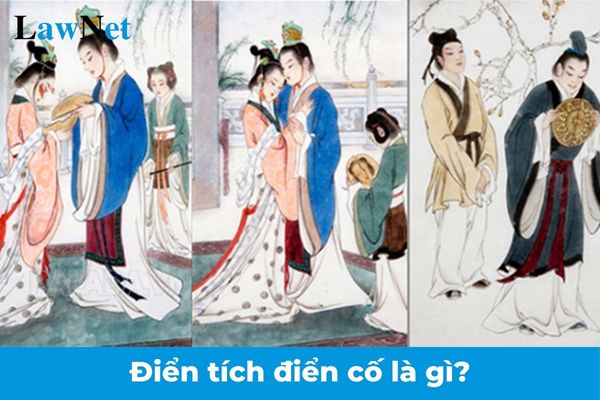What do historical and classic references mean? What are the characteristics and effects of historical and classic references? What literary knowledge will 9th-grade students in Vietnam learn?
What do historical and classic references mean? What are the characteristics and effects of historical and classic references?
Historical and classic references are literary elements rich in classical color, drawn from stories, historical events, literature, or famous figures from the past.
(1) Classic references are old stories, often recounting heroes, examples of filial piety, integrity, ethics, or stories with humanistic philosophy from history; classic ancient poetry and prose appearing in works...
- Example:
+ In the sentence: "The generals and soldiers united as one, blending the sweetness of river water and wine" (Nguyen Trai)
+ The classic reference (in bold) draws from an old Chinese story: "A skillful military commander received a jar of fine wine. He mixed it with the river's water for everyone to drink, which moved the soldiers, uniting them to fight."
(2) Historical references are ancient stories and traditions from the cultural past of humanity. They can be the name of a story, a land, a character, or a poetic literary image filled with drama, conveying deep philosophical reflections on the myriad aspects of life...
- Example:
+ In the verse: "Melancholy brims full like a shaking cup / Three autumns compressed into a single day" (Nguyen Du)
+ The historical reference (in bold) is referenced from the Book of Poetry (ancient Chinese folk songs): "One day not seeing each other feels like three autumns."
Characteristics of historical and classic references:
- Origin: Stemming from valuable literary, historical, and folk works.
- Conciseness: Carrying deep, succinct, and concise meanings.
- Ambiguity: Can be interpreted in various ways depending on the context.
- Imagery: Creates lively, evocative images.
- Tradition: Part of the nation's cultural heritage.
Effects of historical and classic references:
- Enriching language: Creates diversity and richness in expression.
- Enhancing imagery and emotion: Helps readers vividly imagine the described objects or phenomena.
- Increasing expressiveness: Clearly conveys the feelings and emotions of the writer.
- Enhancing the aesthetic value of the text: Makes the text scholarly and elegant.
- Creating a link between past and present: Helps readers understand the nation's culture and history more deeply.
Note: The content is for reference only.
Exercise on historical and classic references
Identify the historical and classic references and state the effects of using them in the following cases:
a.
The tiger tent set up among the central military court,
Tu Cong compares with the lady sitting together.
The prior strictness, drums not yet ceased,
Name-listing first awaits outside the court's gate.
(Nguyen Du, Tale of Kieu)
b.
Invites Thuc Lang with a sword,
Face pale as dye, body trembling slightly.
The lady says: "A thousand mountains weigh heavily,
Lin Tri the old acquaintance, do you still remember?
Sam, Thuong not keeping the word of companionship,
Whom to blame, dare not betray the old friend’s heart?
Nearly the end of ninety, silver looks by the ounce.
Gratitude easily expressed, it's called repaying a favor, [...] "
(Nguyen Du, Tale of Kieu)
Answer:
The historical and classic references in the sentences:
a. The word "tiger," used by Nguyen Du to denote the demeanor of the hero Tu Hai. Referring to the majesty of a court of gratitude and grievance being held, with Kieu and Tu Hai as the presiding figures.
b. Allusion: Sam, Thuong: referring to the stars Sam and Thuong. Denotes distant emotions, never able to meet.
Note: The content is for reference only.

What do historical and classic references mean? What are the characteristics and effects of historical and classic references? What literary knowledge will 9th-grade students in Vietnam learn? (Image from the Internet)
What literary knowledge will 9th-grade students in Vietnam learn?
Under Section 5 of the General education program in Literature issued with Circular 32/2018/TT-BGDDT, 9th-grade students in Vietnam will learn the following literary knowledge:
- Content and form of literary texts
- Main inspiration and ideologies of the work
- Plot, characters; dialogues in Nom poetry stories
- Space, time, details, plot, main characters, narrator in legendary and detective stories
- Narrator's words and character's words; dialogues and monologues in story text
- Double seven six eight poem: stanza, number of words, lines, rhyme, meter
- Conflict, action, plot, character, dialogue in dramatic scripts (tragedy)
- Overview of literary history and the role of literary history in text comprehension
What are the required outcomes for writing practice in the 9th-grade Literature curriculum in Vietnam?
Under Section 5 of the General education program in Literature issued with Circular 32/2018/TT-BGDDT,the required outcomes for writing practice in the 9th-grade Literature curriculum in Vietnam are as follows:
- Write a creative narrative, possibly mimicking a read story; use descriptive and expressive elements within the story.
- Initially learn to compose an eight-word poem. Write a paragraph showing thoughts on an eight-word poem.
- Write an argumentative essay on a problem needing resolution; present a feasible and persuasive solution.
- Write an analytical essay on a literary work: analyze the content, theme, unique artistic features of the work, and its aesthetic effect.
- Write an explanatory piece on a scenic spot or historical site, using diagrams, tables, or illustrations.
- Write an advertisement or flyer about a product or activity, combining linguistic and non-linguistic means.

